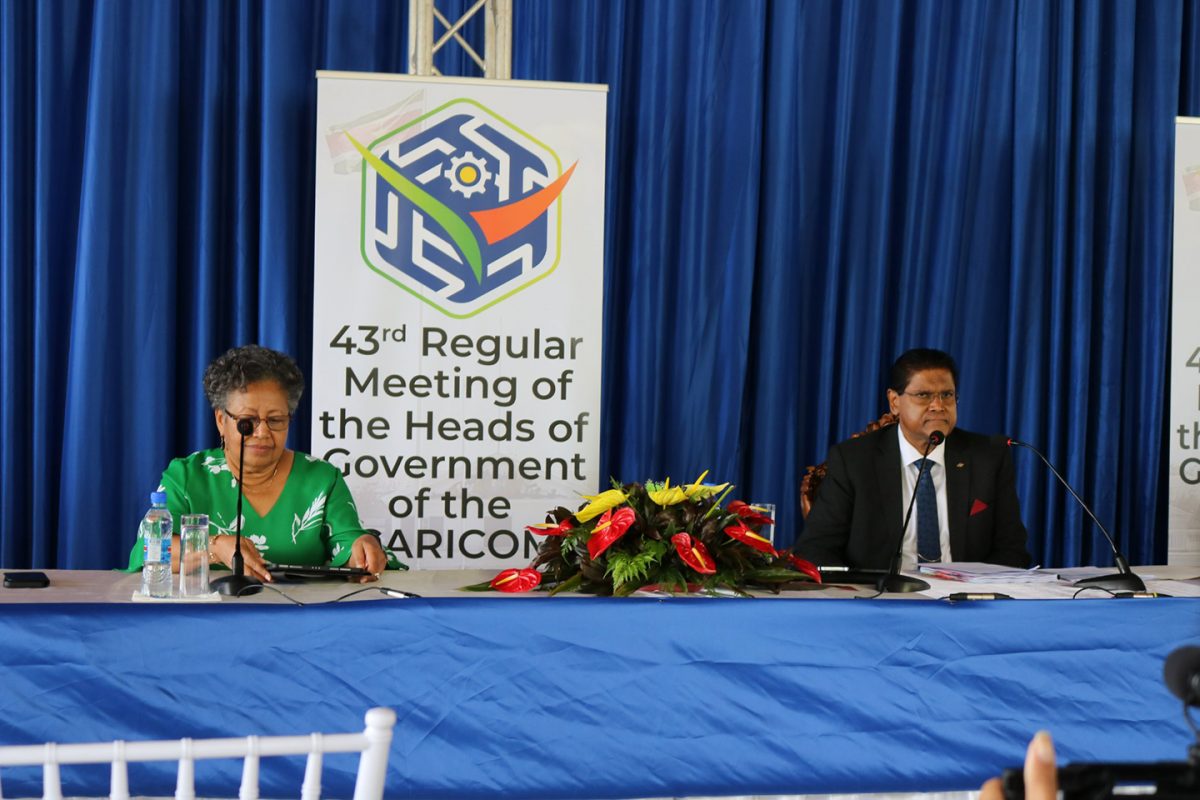Extensive dialogue to accelerate the region’s response to pressing issues, such as food and energy security, climate financing, and integration of regional markets are on the agenda for discussion at the 43rd Regular Meeting of the Heads of Government of the Caribbean Community (CARICOM), which will begin today.
The Heads of Government meeting is being held Paramaribo, Suriname and will conclude on Tuesday.
At a news conference yesterday at the Suriname Presidential Palace, Suriname’s President Chandrikapersad Santokhi, who is the new Chairman of CARICOM, gave an overview of the agenda when responding to questions about whether the region will be discussing solutions to the energy crisis currently gripping many nations.
While Trinidad and Tobago holds the portfolio for the creation of a regional energy strategy, Santokhi said, if there is an agreement for the exportation of gas from Guyana, Suriname and Trinidad and Tobago, they can move swiftly to have that underway. This, he said, will be of tremendous aid to the region given the current crisis that has developed due to the war between Ukraine and Russia.
“If we will agree to design, as quickly as possible, a common strategy to speed up the exportation of the gas then as a region, you can support the entire world and particularly the Caribbean region with fertilisers,” the Surinamese leader said as he pointed out that the move will also in aid the region’s food security goals.
CARICOM Secretary General Dr. Carla Barnett explained that with energy security being a top priority across the region, discussions will be entertained. She stated that at the recently concluded Summit of the Americas, Caribbean countries engaged in discussion with the United States. Since then, she stated, there have been follow up and active discussions, which will continue during the meetings over the next three days.
During the three-day engagement, Suriname will also present the industrial policy drafted for the Caribbean but Santokhi stopped short of providing insights to what the policy contains.
Caribbean leaders will also receive updates on the recently-concluded CARICOM Agri-Investment Forum and Expo that was held in here in May and be given the opportunity for have follow-up discussions.
Additionally, discussions are also expected to take place on countries removing non-tariff barriers for trade.
Barnett explained that while it is critical in the promotion of trade, there has to be an understanding that countries are looking to safeguard their people. This, she said, has resulted in stringent measures that have been put in place and now requires countries being willing to follow guidelines of sister countries.
Santokhi said Suriname has been investing in laboratories to ensure it meets the criteria for exporting foods and achieving food safety.
“But sure you need also to meet the standards and the criteria for food safety and therefore you have to put the mechanisms in place, the laboratories in place… to examine all the products that you want to export and consume… all these products should meet the criteria for food safety and that is the guarantee everyone wants,” he said.
During the Agri-Invesment Forum held in May, leaders complained bitterly of the rigid non-tariff barriers in place by some countries. These, it was argued, serve as an impediment to free trade of products and fresh produce from the region.
Meanwhile, both Barnett and Santokhi dismissed claims of the Heads of Government meeting being another “talk shop.”
“A lot of what CARICOM is set up to do and does every day is not what we often see reported in the media. There is a lot of work that we do, for example, in facilitating trade on a daily basis,” the Secretary General said as she highlighted the robust movements in the region to ensure there is a reduction in the region food importation bill by 2025 since the last meeting in Belize.
She stated that during the engagement CARICOM will be looking at ways in which they can improve their work and set timelines to achieve their goals.
“We make decisions that are implementable… Sometimes we, we are not bound by time and we don’t act as fast as we could or should. So we are doing that kind of introspection at this meeting to determine what can be done to improve the way we implement decisions,” she underscored.
The Surinamese President added that many of the policy decisions and frameworks are being done in the background, indicating that there is action by member states to meet their responsibilities.
He added that committees have been set up to address development financing, food security and climate crisis. Over the course of the conference, Santokhi said, they will be moving ahead with naming persons to sit on these committees.
“Yes there are issues which are taking some time or more time [but that is] because you need to address in close cooperation with other institutions and regional institutions. But we will continue to put that on the agenda until we get results, what is need for our Caribbean Community” he said as he sought to brush off the criticism.
Guyana’s President Irfaan Ali yesterday arrived in Suriname for the Heads of Government meeting. He led a delegation comprising of Minister of Foreign Affairs and International Cooperation Hugh Todd, Ambassador to CARICOM and Director of the Department of the Americas in the Ministry of Foreign Affairs George Talbot; Director-General in the Ministry of Agriculture Madanlall Ramraj; and Director of the Local Content Secretariat in the Ministry of Natural Resources Martin Pertab.






